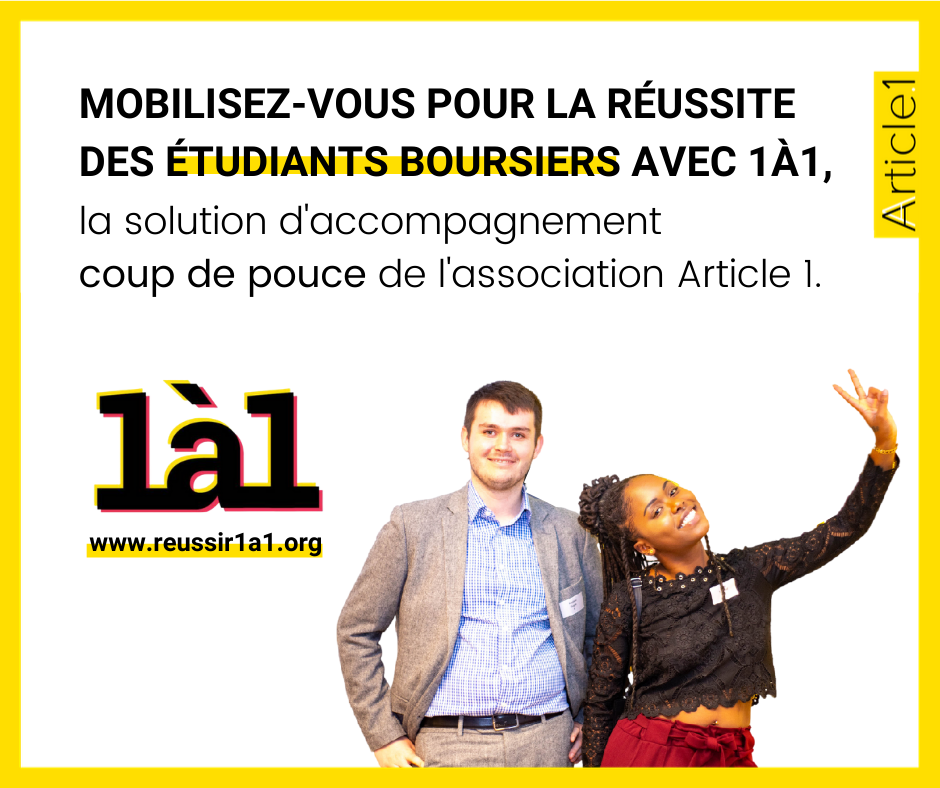What if mentoring was the helping hand they needed?
Few organisations are as interconnected with the Societe Generale Foundation as non-profit
organisation Article 1.
In 2007, the newly-created Foundation began supporting Frateli’s actions, before supporting
Passeport Avenir’s actions a few years later.
In 2018, Frateli and Passeport Avenir merged to form Article 1, a non-profit organisation supported by the Societe Generale Foundation since its creation.
It has to be said that the spirit of each of these organisations is perfectly aligned with the Foundation’s mission to support the integration of young people from underprivileged backgrounds.
Birth of a viral success
For 1à1, everything started with a pandemic. It was Covid-19 that triggered the creation of this new initiative.
Given the risk of young people dropping out during the first lockdown, a group of non-profits led by Article 1 launched #RéussiteVirale (#ViralSuccess), a scheme that helped 3,300 sixth-form and
university students through a “helping hand” mentoring programme, which aimed to provide moral support, as well as academic support or help finding an internship.
At the end of these three months of strict lockdown, when the students went back to their classrooms... the feedback was almost unanimous: “it’s not because we’re no longer in lockdown that it should stop there”, as one of them summed it up.
These little “helping hands” were vital to their beneficiaries and they were clearly useful even beyond the context of the pandemic.
#RéussiteVirale was a spontaneous response to an identified need, a necessary initiative during this period, but which had been carried out in an almost DIY fashion by its coordinators, with the mentors and mentees all matched by hand.
To ensure the sustainability of this action, the approach would have to become more professional... shift from a DIY to an industrial scale and offer even more comprehensive support.

Platform social media campaign
The 1à1 platform
The result of this process is reussir1a1.org, a free digital mentoring platform where it’s now an
algorithm that matches mentors with their mentees after comparing the needs expressed by the students and the support proposed by the volunteers.
The aim of the programme is to ensure students continue their education, especially students with scholarships or who are in difficulty.
It took 6 months of work, with the support of Accenture, to develop a product that puts the pairs into contact automatically by text message and email, leaving the team to perform monthly follow-ups to check if the relationship is going well.
The platform is now ready to go from 3,300 helping hands during the crisis to an unlimited number of quality mentoring relationships (the stated target is 15,000 to 20,000 helping hands by the end of the year) to help young people in the long-term.
Why should you get involved?
How do you convince an employee of a major company to become a mentor on the 1à1 platform? When we asked Charles-Henry Chöel, Director of post-baccalaureate programmes at Article 1, he jumped straight in:
“First of all, because you think you will be giving your time, when in fact you will certainly get more out of it than you put in. And not many people seem to regret doing it as 80% of those who have tried it once carry on afterwards... because it’s addictive: you feel useful! And then, because it enables you acquire new skills related to goodwill and active listening among other things... that could be useful later on.”
It is also not a very demanding commitment as they only need to be involved for 2 to 3 hours a month for 3 months. At the end of these 3 months, they can do it again for 3 months or choose a longer form of commitment that will give them access to events attended by other mentors.
Mentors – and mentees – can sign up on reussir1a1.org.
